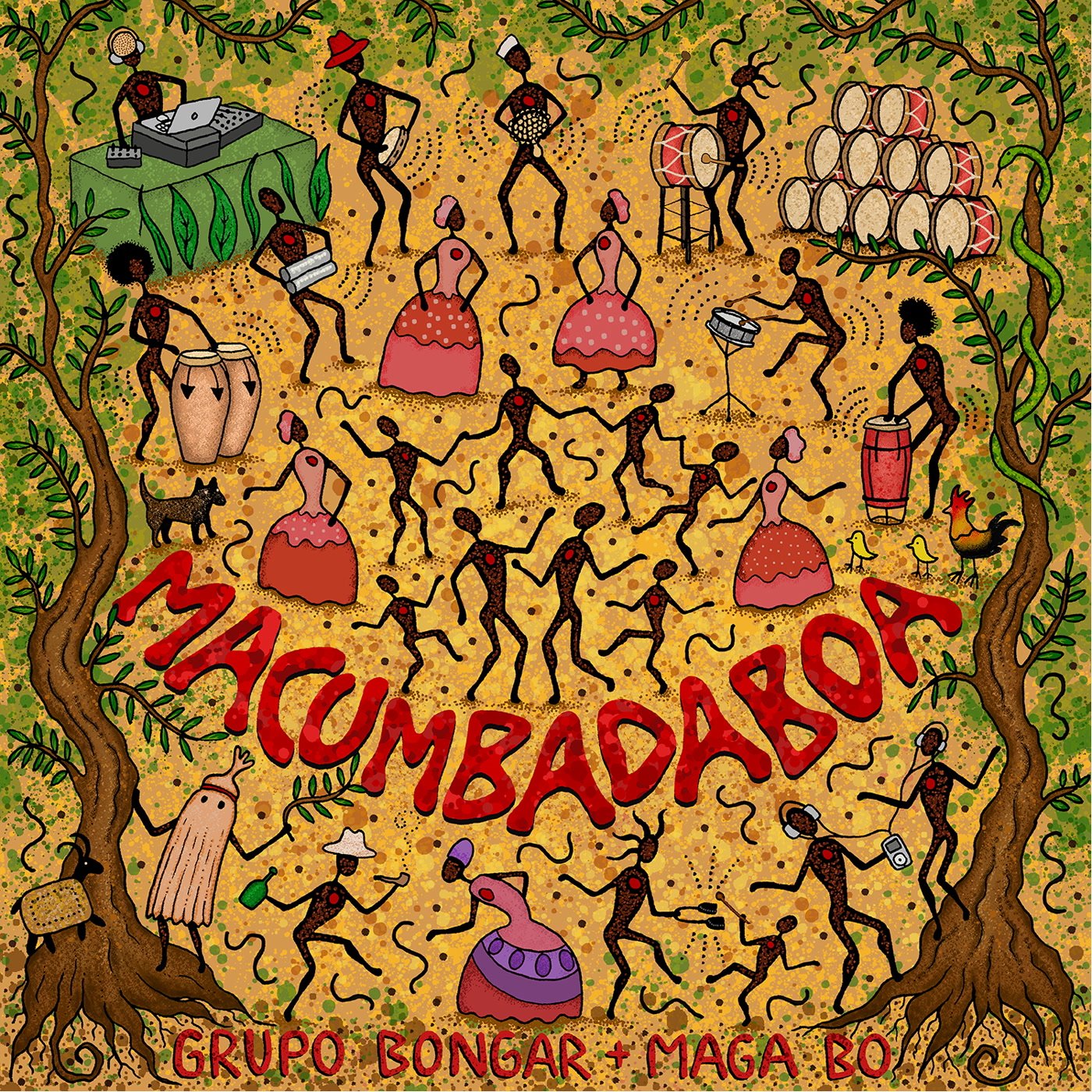- Digital
Grupo Bongar & Maga Bo
Macumbadaboa
Kaxambu Records
- Cat No: KAX014
- Release: 2019-10-01
- updated:
Track List
-
1. Grupo Bongar & Maga Bo - Macumbadaboa
04:25 -
2. Grupo Bongar & Maga Bo - Manhancá (Xambáfricou)
03:35 -
3. Grupo Bongar & Maga Bo - Dentro da Vila do Cabo
04:20 -
4. Grupo Bongar & Maga Bo - Machadeiro
04:44 -
5. Grupo Bongar & Maga Bo - Ogum Beira-Mar
06:05 -
6. Grupo Bongar & Maga Bo - Passuê
03:45 -
7. Grupo Bongar & Maga Bo - Xexerê Balé
05:59 -
8. Grupo Bongar & Maga Bo - São Saruê
03:53 -
9. Grupo Bongar & Maga Bo - Omixexê
04:19 -
10. Grupo Bongar & Maga Bo - Vem Amor
02:31
16bit/44.1khz [wav/flac/aiff/alac/mp3]
"Very cool!" - DJ Chilly, KEXP
"Sounds very good to us!" - Radio Panik
"la intervención de la electrónica genera espacios que abren nuevas ventanas, como en esas escenas futuristas en las que lo tecnológico se ve apuntalado, validado y eclipsado por lo originario." - Cassette Blog
“Macumbadaboa” unites the ancestral sounds of Grupo Bongar from Pernambuco, Brazil with the electronic and dub elements of Maga Bo, the American/Brazilian DJ/producer based in Rio de Janeiro. The project includes the participation of various well known Pernambuco artists - Isaar, Cláudio Rabeca, Lia de Itamaracá e as Filhas do Baracho, Lu do Coco do Pneu, members from the Xambá terreiro, children from the local community as well as the Malian kora player Adama Keita. The album explores many northeastern Brazilian rhythms such as coco, afoxé and maculelê as well as subtle elements of electronic and dub music.
The songs were recorded in an improvised studio set up by Maga Bo in the Memorial Severina Paraíso da Silva - Mãe Biu, in the terreiro of Xambá in Olinda. The intention was to bring Grupo Bongar into a familiar atmosphere where Guitinho could compose music and lyrics on the spot, inspired by the history of the Xambá community which was represented by all of the photos, antiques and relics that surrounded them in the Memorial.
“The lyrics emerged from observing the pieces that make up the Memorial. The old photos, the utensiles used in the terreiro in the time of Mãe Biu, the old percussion instruments, the maps of Nigeria and Cameroon (where the Xambá folk originated) and the articles of clothing from that time. Finally, everything that reminds us of our history and the history of our people,” explains Guitinho. “The repertoire of this album brings traditional songs for the orixás and the entitiies of Jurema. The original lyrics emerged in the moment, through my observation of the pieces in the Memorial, during the recording.” - Marileide Alves
"Sounds very good to us!" - Radio Panik
"la intervención de la electrónica genera espacios que abren nuevas ventanas, como en esas escenas futuristas en las que lo tecnológico se ve apuntalado, validado y eclipsado por lo originario." - Cassette Blog
“Macumbadaboa” unites the ancestral sounds of Grupo Bongar from Pernambuco, Brazil with the electronic and dub elements of Maga Bo, the American/Brazilian DJ/producer based in Rio de Janeiro. The project includes the participation of various well known Pernambuco artists - Isaar, Cláudio Rabeca, Lia de Itamaracá e as Filhas do Baracho, Lu do Coco do Pneu, members from the Xambá terreiro, children from the local community as well as the Malian kora player Adama Keita. The album explores many northeastern Brazilian rhythms such as coco, afoxé and maculelê as well as subtle elements of electronic and dub music.
The songs were recorded in an improvised studio set up by Maga Bo in the Memorial Severina Paraíso da Silva - Mãe Biu, in the terreiro of Xambá in Olinda. The intention was to bring Grupo Bongar into a familiar atmosphere where Guitinho could compose music and lyrics on the spot, inspired by the history of the Xambá community which was represented by all of the photos, antiques and relics that surrounded them in the Memorial.
“The lyrics emerged from observing the pieces that make up the Memorial. The old photos, the utensiles used in the terreiro in the time of Mãe Biu, the old percussion instruments, the maps of Nigeria and Cameroon (where the Xambá folk originated) and the articles of clothing from that time. Finally, everything that reminds us of our history and the history of our people,” explains Guitinho. “The repertoire of this album brings traditional songs for the orixás and the entitiies of Jurema. The original lyrics emerged in the moment, through my observation of the pieces in the Memorial, during the recording.” - Marileide Alves



